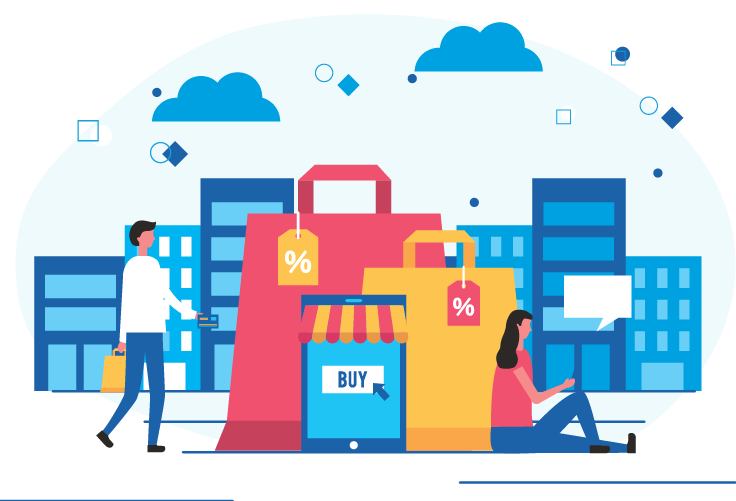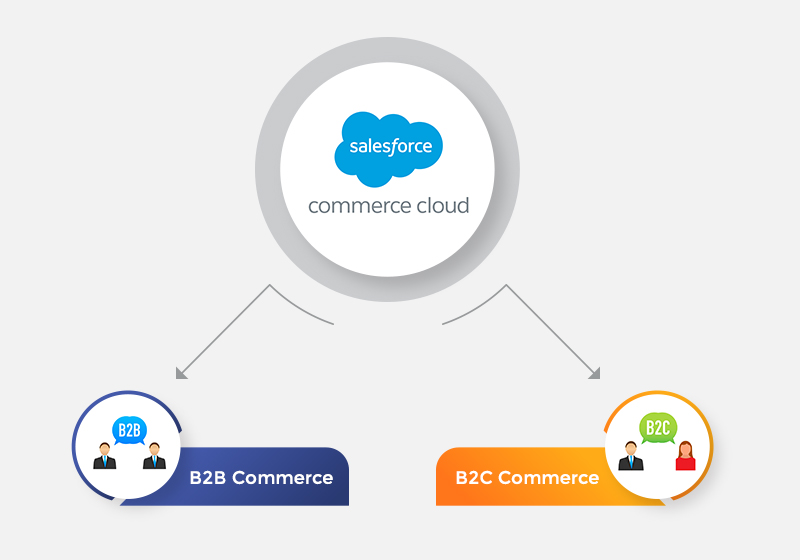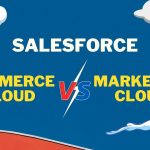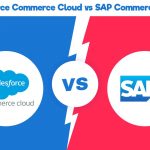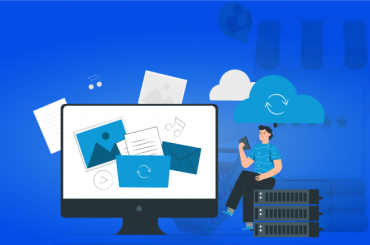Salesforce Commerce Cloud Implementation Guide – Comprehensive Solution
Last Updated | April 28, 2023
Table of Contents
Online businesses of all sizes can design a distinctive buyer’s journey for each client using the tools provided by Salesforce Commerce Cloud.
It meets consumers where they are and gives them the tools, they need to make profitable transactions with ease.
For a 360-degree view of each client and business operation, the application unifies sales, marketing, order fulfilment, advertising, and customer service under a single platform.
The blog addresses the most frequently asked questions about the Salesforce Commerce Cloud Implementation guide and provides prospective users with a thorough understanding of what it is, what it can do.
How to start using it right now, and how utilizing the platform could benefit your company by learning about its key features, benefits, and potential drawbacks.
Compare the similarities and differences between Salesforce Commerce Cloud vs Demandware
What’s in Salesforce Commerce Cloud (SFCC)?
Let’s start this Salesforce Commerce Cloud implementation guide with some basics of Salesforce Commerce Cloud development.
A software-as-a-service (SaaS) option for B2C and B2B online shops is called Commerce Cloud. The cloud-based platform’s AI-powered features and omnichannel abilities enable seamless brand engagement for customers on any platform (web, store, social, and mobile).
This results in a more tailored purchasing experience.
Every step of the customer lifecycle is designed to be engaged with by Commerce Cloud, which meets customers wherever they are and gives them the information they need to make wise purchases.
Additionally, the software provides businesses with the tools they need to successfully develop, create, market, and promote an online store.
All of the following functions are combined: brand management, sales, content marketing, data, automation, reports, analytics, and predictive intelligence.
Read about top Salesforce trends that will help businesses keep up with all the latest Salesforce future developments
-
Salesforce Commerce Cloud Implementation Guide – SFCC Pros
- The Einstein AI
- Effective growth tactics
- Consumer behavior insights based on data from a simplified checkout process
- Automating manual processes
- Managing multiple stores
- Multi-tenant clouds platform
- Regular automated new and interesting features updates
- Intuitive upgrades
- Infrastructure with no borders and security for global marketing
- Flexibility and agility
- A full-circle perspective of your clients
-
Salesforce Commerce Cloud Implementation Guide – SFCC Cons
Here are some difficulties users of the platform could run into.
- Utilizing all of the software’s functions could be challenging.
- Requests might not get a prompt response from customer service.
- If the transition is not handled quickly and effectively, sales may be lost.
- The software programming language may be difficult for developers to read if they haven’t received formal SFCC training.
- For smaller or less successful firms, it could be expensive.
- The user interface may contain inconsistencies.
What Are The Core Products Of SFCC?
The two main products of Commerce Cloud are:
- B2B Commerce
- B2C Business
The B2B platform aids companies of all sizes in expanding quickly to meet the escalating expectations of their clients. By fusing CRM information with the shopping experience, the Salesforce B2B Commerce integration also enables businesses to gain insight into consumer behavior.
By providing customers with a distinctive experience, business-to-business commerce enables companies to increase revenue.
To improve customer experiences, Salesforce B2C Commerce developer adopts a mobile-first strategy and supports simple customization and clever customization.
Content management, advertising, merchandising, marketing, fulfilment, customer support, and predictive intelligence are just a few of its many features.
Read this article to know which one is superior: Salesforce Commerce Cloud Vs Salesforce Marketing Cloud
Salesforce Commerce Cloud Implementation Key Features, Benefits, and Pricing?
-
Salesforce Commerce Cloud Implementation Guide – SFCC Features
-
Einstein AI
Businesses no longer need data scientists to customize the browsing and purchasing experience for each customer thanks to Einstein AI. Using information about a customer’s search and purchase history, Einstein’s predictive intelligence skills create a customized experience for each customer.
-
Limitless Aisles
Customers at brick-and-mortar stores now have more options because digital inventory is offered in addition to what is on the floor.
Endless Aisle enables firms to distribute goods to clients from any location for quicker and more affordable delivery, helping them avoid missing revenue.
-
Reference Architecture for Storefronts
With this cutting-edge framework, you can quickly create a personalized, expert website. To successfully maintain your website, you could use pre-designed wireframes, integrated digital innovation tools, and valuable integrations for changes.
-
Order Management
You can automate the payment transactions, handle refunds and cancellations, and streamline the steps of completing and shipping customers’ orders around the world with Order Management SFCC.
-
Trade Portals
By engaging and motivating them with loyalty programs, you may establish a long-lasting relationship with your clients. You may offer your clients relevant learning resources at every point of their purchasing journey since SFCC allows you to track consumer behavior statistics.
Through communities, newsletters, and social media, you may also provide your customers with pertinent content and brand updates.
Compare the similarities and differences between Salesforce Commerce Cloud vs Demandware
-
Salesforce Commerce Cloud Implementation Guide – SFCC Benefits
-
Omnichannel Functionalities
eCommerce, order management, and offline retail operations may all be combined into one SaaS system by SFCC.
The main goal of this platform is to make it possible for merchants to manage their operations across many channels from a single platform. It is generally thought to scale up operations, sales, and fulfilment.
-
Internationalization
Businesses can manage several stores at diverse locations throughout the world with SFCC from a single back-end platform.
You can manage your entire product data set for several stores with SFCC. Additionally, you can control other details like billing, pricing, product availability, etc.
-
Excellent Customer Service
All of the users of Salesforce Commerce Cloud have access to 24/7 support. They take care to address all issues, from correcting codes to enhancing security issues to assisting with numerous problems.
Explore the complete Salesforce 360
-
Improved Marketing Features
You may increase conversion rates and average order values by providing your customers with the ideal product, variety, price, offer, and content at the ideal time with SFCC.
Overall, you will have access to a single point of contact for handling all of your paid advertising, email marketing campaigns, social media management, and reporting needs for your company.
Read about How To Go Headless With Salesforce Headless Commerce
-
Intelligence Forecasting
To streamline processes and save time, Salesforce created Einstein AI to broaden the application of artificial intelligence to eCommerce enterprises.
Third-party extensions and manual data analysis are no longer necessary thanks to this next-generation artificial intelligence platform.
Third-party AI products that aid with data analysis and automate all of your digital marketing initiatives can now be integrated with SFCC.
-
Salesforce Commerce Cloud Implementation Guide – SFCC Pricing
Depending on your business’s B2C or B2B nature (or both), and the platform version you select, the exact cost will vary (Starter, Growth, or Plus).
Options come with a variety of features. Apps and other products you add to your purchase might affect pricing, as can the size of the product catalogue and the number of storefronts.
Salesforce Commerce Cloud does not make its cost available online because it might vary so much depending on the customer. Get in touch with an expert to get a quotation and find the ideal solution for your company’s requirements.
Best Salesforce Commerce Cloud Implementation Practices That Can Take Your eCommerce Strategy to the Next Level
You must adhere to a few best SFCC implementation practices to reap the greatest benefits from this strategy. It will assist you in maximizing performance and precisely achieving your business goals.
The following are some of the greatest techniques for maximizing SFCC potential:
-
Optimization of Front-end Performance
It is crucial to have a user-friendly front-end experience if you want to please your target consumers and create rewarding purchasing experiences.
You may exert more influence over defining the end-user experience by effectively managing critical factors like page loading, stability, and consistency. You can enhance the browsing experience and increase consumer loyalty.
-
Utilizing Outside Assistance
There are numerous built-in business management tools for your site’s performance audit. They aid in both pinpointing the precise problems and determining the best methods to solve those problems.
-
Using The Jobs And Schedulers Effectively
Data backup, data importing/exploring, and searching index building are just a few of the complex activities that may be compressed and automated using SFCC Jobs. You can quickly complete tasks in minutes rather than hours by carefully configuring jobs and associated schedulers.
-
Optimizing Top Content Performance
Optimizing the view of sites like category and product description pages, which directly contribute to business transactions and sales, is equally as vital as optimizing the view of the homepage.
Final Words
For SFCC to be implemented in a way that positions a business for success, a certain level of expertise is needed.
You require Salesforce-certified developers who are familiar with the program’s design and programming language if you want to make the most of it and grow your business to its maximum potential.
For your particular demands, they could implement and modify the platform to include the necessary capabilities. They can also offer continuing site support and maintenance.
With more than 15 years of Salesforce Commerce experience, Folio3 Commerce is a Salesforce Commerce Cloud consultant. Folio3 is one of the top Salesforce implementation partners.
You won’t ever be left in the dark because Folio3 will deploy and set up SFCC for your company and provide ongoing support and training after your site is up and running.
We hope our Salesforce Commerce Cloud implementation guide turns out to be a helpful source of knowledge on SFCC.
If you need any assistance regarding SFCC or other platforms like WooCommerce Integration or BigCommerce web design company we will be delighted to help you out.


